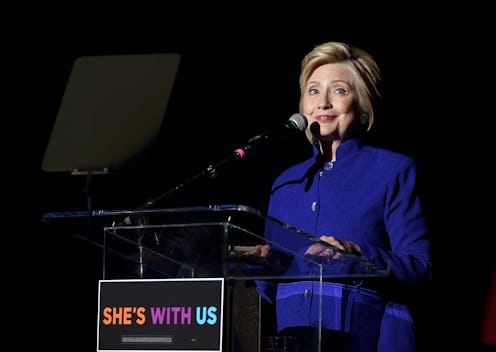Less than 24 hours before the June 7 primaries began, the Associated Press announced that Hillary Clinton had secured enough superdelegates to become the presumptive Democratic presidential nominee. However, this is not set in stone, because superdelegates don't officially vote until the Democratic National Convention in July. Until then, there's a chance — no matter how small — that the Democratic nomination could slip through Clinton's fingers.
If the Washington, D.C. primary ends and Clinton still needs to factor in superdelegates to reach 2,383 votes, Bernie Sanders could force a contested convention. Thus, clinging to the nomination will require Clinton to maintain the allegiance of the 571 superdelegates who have already promised to support her. And if she wants to avoid a contested convention altogether, she'll need to win at least 571 more pledged delegates to prove that her nomination is an undeniable reflection of the popular vote.
Ultimately, unpledged delegates — not votes — tipped the scale in Clinton's favor, on a night when no primaries or caucuses were being held. During this next month, Clinton will have to remind superdelegates why they're voting for her to ensure they're not persuaded to back Sanders instead. And according to Sanders' campaign adviser, Tad Devine, he's relying on them to do just that:
So if you're going to win the nomination of the party you're going to win it with superdelegates, and even the Democratic National Committee -- officially, their spokesperson -- is out on the record saying that superdelegate's votes should not officially be counted until the convention itself.
And at a news conference in Los Angeles on Saturday, Sanders said he will bring his testimony to the superdelegates at the National Convention, nevertheless acknowledging the probable reality of the matter:
We understand that we have a steep climb. I'm not here to tell you that tomorrow we're going to flip 300 superdelegates. You don't hear me say that. But I am saying we are going to make the case.
Unless Clinton loses abysmally in the June 7 primaries, it's unlikely that superdelegates will experience a change of heart. Of the six states voting on Tuesday, California's 546 delegates and New Jersey's 142 delegates will be the main focus of the race. If Sanders wins a majority of votes from the two most important states, he may stand a chance to win the nomination by encouraging superdelegates to mirror the people's popular vote. Clinton can eliminate the risk of a contested convention only by winning as many pledged delegates as she has unpledged delegates — 571 in total. With seven primaries left, that's still a possibility.
The front-stage role of these unpledged delegates, as well as the timing of some press declaring her the presumptive nominee, have left a bad taste in the mouths of Sanders supporters. At the same time, Clinton knows that she will ultimately need his supporters in the general election. Thus, she too has been hesitant to react to this news prematurely. At a rally in California on Monday night, she mentioned the announcement but didn't celebrate:
According to the news, we are on the brink of a historic, unprecedented moment, but we still have work to do. We have six elections tomorrow, and we are going to fight hard for every single vote, especially right here in California.
In fact, Clinton found herself in Sanders' position during the 2008 race against Barack Obama. On June 6, 2008, she announced that instead of forcing a contested convention, which would risk dividing the party, she would drop out. If anything, the candidate has learned to tread lightly until the results are settled for certain.
